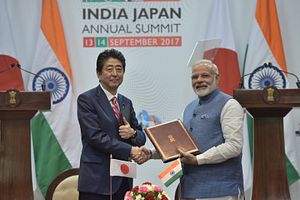India and Japan will be discussing and likely finalizing a base sharing pact at an upcoming bilateral summit meeting between Prime Minister Narendra Modi and his Japanese counterpart, Shinzo Abe, later this month, according to Indian government sources. The so-called acquisition and cross-servicing agreement (ACSA) would allow the Indian military and the Japan Self Defense Force (JSDF) to use each other’s bases for logistical support
Discussions over deeper military cooperation between the two countries, including the sharing of military assets and capabilities in the logistical sphere, are expected to take place during the upcoming 13th India-Japan summit held in Tokyo on October 28-29. In detail, the agreement would allow the Indian Navy (IN) access to a Japanese base in Djibouti, while the Japan Maritime Self Defense Force (JMSDF) would be permitted to use India’s military installations on the Andaman and Nicobar Islands located in the Indian Ocean, next to other naval facilities.
“Sources said the pact would require armed forces of India and Japan to help each other with logistic supports, including food, water, billet, transport (airlift, if necessary), petroleum, oils, lubricants, clothing, communications, medical services, base support, storage, use of facilities, training services, spare parts, repair and maintenance and airport and seaport services,” the India-based Deccan Herald reported on October 17. Neither India nor Japan officially revealed details of the agreement. However, it is likely going to resemble similar agreements that India concluded with France this year and the United States back in 2016.
The proposed base sharing agreement was already discussed during the annual India-Japan Defense Ministerial Dialogue held in New Delhi this August with both sides agreeing to its rapid conclusion. “The (early) conclusion of the bilateral ACSA is important for creating an environment to allow the SDF [Self Defense Force] and the Indian military to conduct sufficient joint exercises,” Japanese Defense Minister, Itsunori Onodera, told reporters at the conclusion of the dialogue on August 21.
Additionally, the agreement was reportedly the subject of further discussion during last week’s meeting of the Indian national security advisor, Ajit Doval, with his Japanese counterpart, Shotaro Yachi, in New Delhi. Notably, the agreement would not in any way commit a country to any military action. It is unclear whether the ACSA is already expected to be signed this month, although there have been indications that both sides seek a rapid conclusion of negotiations given mutual plans to increase the number of joint military exercises in 2019 and 2020.
Neither India nor Japan has so far released an official meeting agenda for the October summit meeting. “Under the framework of the Special Strategic and Global Partnership between India and Japan, the two leaders will have wide-ranging discussions over two days on bilateral, regional and global issues of mutual interest,” an October 12 Indian government press release about the upcoming bilateral summit states, without offering details. Any India-Japan logistical agreement is likely to raise hackles in China, which maintains a military base in Djibouti and has been locked in territorial disputes with both countries.
During the summit meeting, Japan is also expected to discuss with India the purchase of 12 Shinmaywa US-2i amphibious search-and-rescue/maritime surveillance aircraft for the Indian Navy. If purchased, the US-2is are slated to be stationed on the Andaman and Nicobar Islands in the Bay of Bengal. India and Japan have been locked in negotiations over this possible $1.35 billion defense deal for the past three years. If concluded, the government-to-government contract would constitute Japan’s first major overseas defense deal since the lifting of a self-imposed embargo on arms exports in 2014.
































